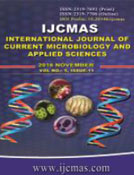


 National Academy of Agricultural Sciences (NAAS)
National Academy of Agricultural Sciences (NAAS)

|
PRINT ISSN : 2319-7692
Online ISSN : 2319-7706 Issues : 12 per year Publisher : Excellent Publishers Email : editorijcmas@gmail.com / submit@ijcmas.com Editor-in-chief: Dr.M.Prakash Index Copernicus ICV 2018: 95.39 NAAS RATING 2020: 5.38 |
Pregnant women need more essential nutrient than other women. The body of pregnant women needs 300 calories per day to support the growth of the baby. It is important to eat healthy foods every day to tissues and organs develop during weeks of your pregnancy and the baby is always growing. The purpose of this study was to identify dietary patterns of pregnant women and examine the association between these patterns and body mass index. This cross sectional descriptive study was conducted on one hundred and fifty Saudi women (150 females) between the ages of 18 and 45. They were chosen by a systemic random method, recruited from hospital women and birth in khamismushayt, Saudi Arabia. This study was carried out to determine (BMI), dietary habits and lifestyle behaviors among pregnant women. The survey was conducted March 2015.A self-administered questionnaire was used to collect the research data. All subjects were asked to complete the Food Frequency Questionnaire (FFQ) with questions on dietary habits. A self-reported height and weight were used to calculate BMI (BMI = weight (kg)/height (m)2). Statistical analyses were performed using the Statistical Package (SPSS). On the basis of self-reported height and weight. The Majority of participants 51.7 % were classified over weight while 24.5 and 23.2 of participant were classified normal and obese respectively. There were significant differences between BMI category and dietary patterns. About 21.3 % from all participants were normal weight who ate meat one to two times per week while 18 % of participants have obese who ate meat rarely per week. About 22.5% of participants were overweight who ate chicken three to four times per week while 26.6% of participants were overweight consumed rarely fish per week and about (23.3%) of pregnant women were obese who consumed rarely cheese during pregnancy. Vegetables and fruits consumed there was statistically significant difference (p<0.001) between all most of participants (28.5%) ate fruits and vegetables one to two times per week. 31.8% from all participants ate sweets one to two times per week. All most of participants (84.1%) reported rarely practicing physical activity while 2 % reported only practice physical activity three times per week. Our results show that there were significant differences between BMI category and dietary patterns but the dietary habits of pregnant women were unhealthy and more than half of participants ate fast foods. Our study suggests that increasing nutrition education and counseling to Promote optimal fetal nutrition, which includes: ensuring appropriate maternal nutrition and micronutrient supplementation before and during pregnancy and providing counseling on diet and food safety to pregnant women.
 |
 |
 |
 |
 |